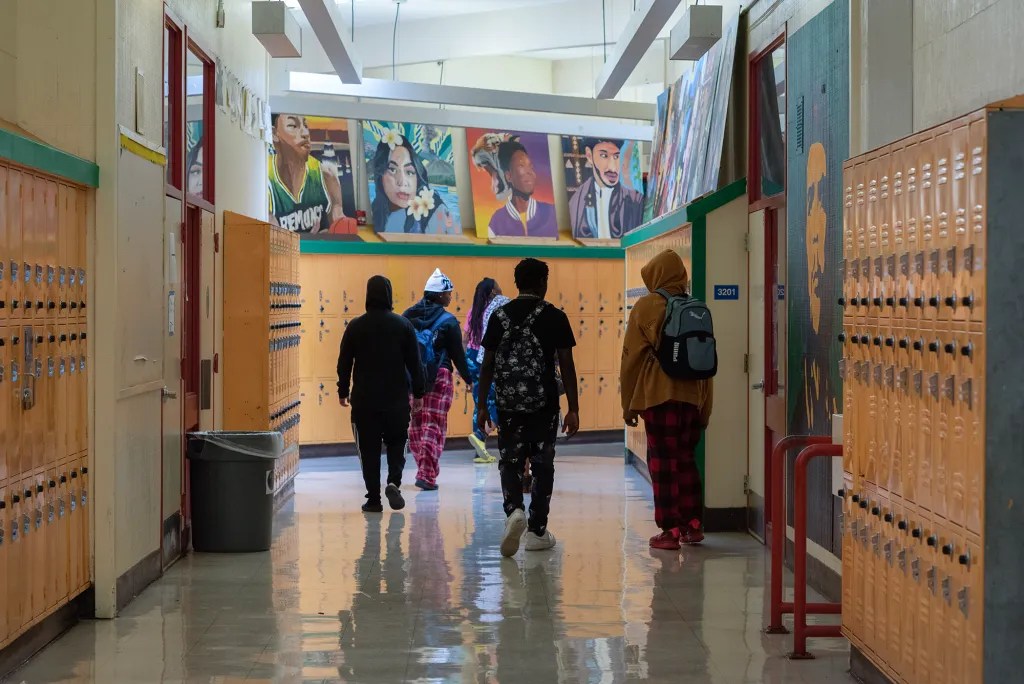BY CAROLYN JONES | CalMatters
The agreement between the state and the ACLU requires state authorities to visit schools, interview teachers, look at individual students’ records and take more hands-on steps to see if a school has a pattern of discriminating.
California will play a more active role in ensuring school districts don’t discriminate against students with disabilities, English learners and Black students, under a legal settlement announced this week.
The agreement between the state and the American Civil Liberties Union of Northern California requires state authorities to visit schools, interview teachers, look at individual students’ records and take more hands-on steps to see if a school has a pattern of discriminating. Specifically, the state will examine whether schools disproportionately suspend Black students or English learners, or deny services to students with disabilities.
“Are we happy? Absolutely. For the first time, the state will now be required to strengthen its monitoring of school districts to prevent discrimination,” said Linnea Nelson, a senior staff attorney at the ACLU.
When CalMatters asked for a comment on the settlement, the California Department of Education sent CalMatters another copy of the settlement. But it has already begun implementing some of the requirements in the settlement, and has set up a hotline for families and students to report discrimination, harassment, intimidation or bullying.
Discrimination is illegal in California schools, but the state has not always taken an aggressive approach to tracking it at individual schools, according to the lawsuit. Instead, reviews focused on broad data such as discipline rates for Black students or other groups, not specific incidents or patterns affecting individual students.
“Now, instead of just looking at the data, we’ll be able to get to the crux of the issue,” said Malhar Shah, an attorney for the Disability Rights Education and Defense Fund, who also worked on the suit. “There’s going to be increased accountability, and practices that went under the radar will now come out in the open.”
Black students, English learners and students with disabilities all have suspension rates higher than the California average, according to state data. Black students are particularly affected. They had a suspension rate of almost 9% last year, compared to the state average of 3.6%.
East Bay district at the center of discrimination complaint
The ACLU settlement stems from a 2021 lawsuit against the state and Pittsburg Unified School District in Contra Costa County, centering on the experiences of a Black student who struggled to receive special education services and was repeatedly suspended.
The girl was traumatized and suffered academically because of the experiences, her mother, Jessica Black, said.
“After a while she felt there was something wrong with her. I would have taken her out (of school), but I didn’t have the resources,” said Black, a single mother.
Pittsburg Unified did not respond to an email request for comment. Its portion of the lawsuit is still pending.
Problems for Black’s daughter, identified as L.G. in the lawsuit, started almost immediately after she enrolled in the district in third grade, Black said. In one incident, a white student teased L.G. because of her Afro-style hair, leading L.G. to throw an apple at him and get suspended.
By the time L.G. was in fourth grade, the school placed her in a special class for students with emotional challenges, even though she did not have an Individualized Education Plan for special education. The girl felt isolated from her friends and floundered academically.
As a result, she was poorly equipped to handle middle school, Black said. The girl was suspended at least 20 times in sixth grade, and at one point the school had her involuntarily detained (or “5150ed”) due to a perceived psychiatric emergency.
By seventh grade, L.G. was enrolled in special education and began receiving services to help with executive functioning skills. In high school she transferred to another school district, graduated early, and is now thriving, Black said.
Related Articles
History-making milestone for San Jose school’s new building
Opinion: To better support California’s students, change our funding formula
Los Gatos Lions Club awards scholarships to local students
Graduation rates plunge at some East Side schools
Bay Area schools look to tackle fentanyl crisis head on
Even though L.G. is doing well now, she missed out on years of services Black believes she was entitled to, such as counseling. The ordeal took a toll on the entire family, Black said.
“It was a complete strain. I was getting calls nearly every day at work, and I didn’t know what to do,” said Black, who works as a community organizer in Oakland. “Psychologically, spiritually, mentally it really weighed on me. I was exhausted.”
While Black is pleased with the settlement, she wishes it went further. She’d like to see the complaint process expedited, so families can get responses sooner if they feel their child is being discriminated against; regular reports to school boards on discipline rates; and more involvement by parents whose children are subject to discrimination “so the people most impacted are part of the accountability process and can help devise solutions.”
She still harbors distrust of the public school system in general, saying it’s too often failed children like her daughter.
“The settlement sounds great, but what’s the follow-up?” Black said. “How does the next generation of kids not go through the same thing my daughter went through? Basically, schools need to treat Black students with humanity.”












